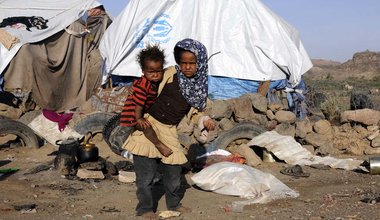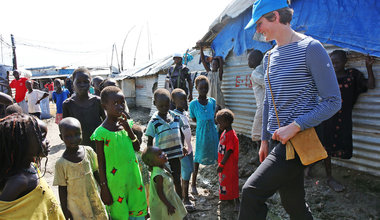Recognize migration’s positive impact, address its challenges in realistic way, urges senior UN official
 Noting that the movement of people across borders is a global reality, a senior United Nations official stressed that policy decisions governing migration must be based on fact and not on perception or myth.
Noting that the movement of people across borders is a global reality, a senior United Nations official stressed that policy decisions governing migration must be based on fact and not on perception or myth.
“There is a lot of misperception in the migration field that needs to be addressed,” Louise Arbour, the Special Representative of the UN Secretary-General for International Migration, said at the opening of a stocktaking meeting on the Global Compact for Safe, Orderly and Regular Migration.
“The global compact for migration is an opportunity to reorient the often-toxic narrative against migrants towards a more accurate narrative on migration that recognizes its overwhelmingly positive impact and is prepared to address its challenges in a sober, realistic way.”
In her remarks, Ms. Arbour also spoke of the need to be “realistic” about how migration happens and how migration policies work and stressed that the complex phenomenon should not be reduced to “simple, binary categories” such as refugees or economic migrants; security or human rights; or legal pathways versus returns.
“Nor can we see migrations as being divided on geographical lines, even while respecting the
regional particularities that do exist. Migration is a truly global phenomenon, neither a unique gift nor burden on any one set of countries,” she added.
The stocktaking meeting being held in Puerto Vallarta, Mexico, follows an intensive preparatory process around the world to inform the development of the global compact. The process saw five regional meetings in Santiago (Chile), Beirut (Lebanon), Addis Ababa (Ethiopia), Bangkok (Thailand) and Geneva (Switzerland). The process also included two multi-stakeholder hearings, seven regional civil society consultations, and numerous national consultations.
“It is the global nature of migration that brings us here today,” said Ms. Arbour, noting that migration’s inherent international nature necessitates a global response and, at the same time, noted that it does not contradict a State’s sovereign right – subject to international and domestic law – to manage who enters and stays within its borders.
“A successful global compact will need to reflect this: its success will rest on maximum State political and moral buy-in and willingness to enhance cooperation at the regional and international levels,” she said.
On the agenda for the three-day meeting are discussions on the global, regional, subregional and national perspectives; perspectives from stakeholders; an ‘Idea Lab’ session which includes ‘TED Talks’ on data and evidence, public perceptions and narratives, and migration and identity; and follow-up and implementation.
 UN
UN






